Finding the right web developer for your team can be a challenging task, especially with the ever-evolving landscape of web technologies. Asking the right interview questions is crucial to assess candidates' technical skills, problem-solving abilities, and cultural fit.
This blog post provides a comprehensive list of web developer interview questions, categorized by experience level and specific areas of expertise. From basic concepts to advanced topics, these questions cover front-end, back-end, and full-stack development, helping you evaluate candidates thoroughly.
By using these questions, you can streamline your hiring process and identify top talent more effectively. Consider complementing your interviews with pre-employment assessments to get a complete picture of candidates' capabilities.
Table of contents
15 basic Web Developer interview questions and answers to assess candidates
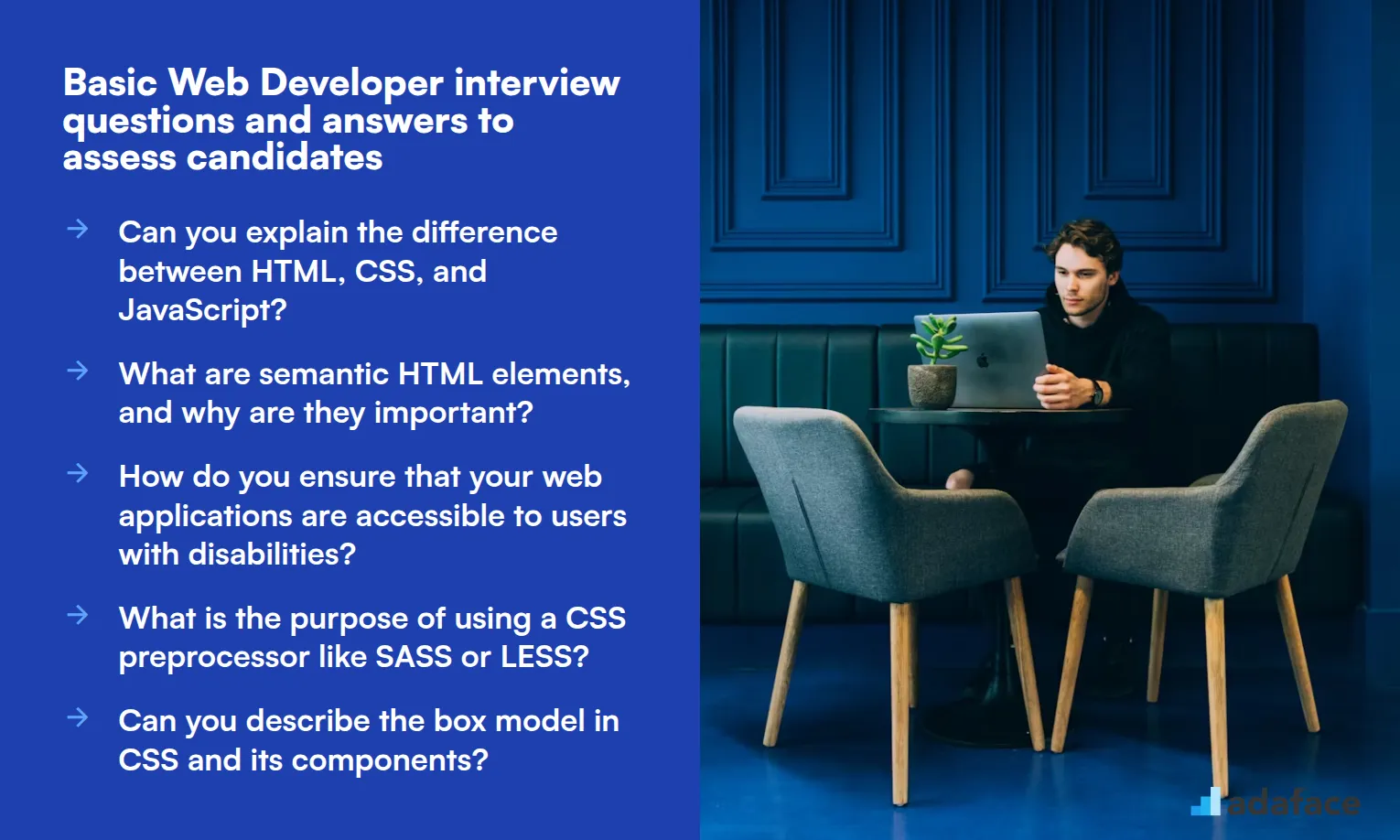
To effectively assess your candidates' fundamental web development skills, you can use this list of essential interview questions. These questions will help you gauge their technical understanding and problem-solving abilities, making it easier to identify the right fit for your team. For a detailed overview of what to look for, check out our web developer job description.
- Can you explain the difference between HTML, CSS, and JavaScript?
- What are semantic HTML elements, and why are they important?
- How do you ensure that your web applications are accessible to users with disabilities?
- What is the purpose of using a CSS preprocessor like SASS or LESS?
- Can you describe the box model in CSS and its components?
- What are the advantages of using responsive design?
- How would you optimize a website's performance for faster load times?
- What is the difference between client-side and server-side scripting?
- Can you explain how AJAX works and where you might use it?
- What are some common security concerns in web development, and how would you address them?
- How do you manage version control in your projects?
- What is the purpose of a content delivery network (CDN)?
- Can you explain the concept of RESTful APIs?
- What tools or methods do you use for debugging web applications?
- How do you test your web applications across different browsers and devices?
8 Web Developer interview questions and answers to evaluate junior developers
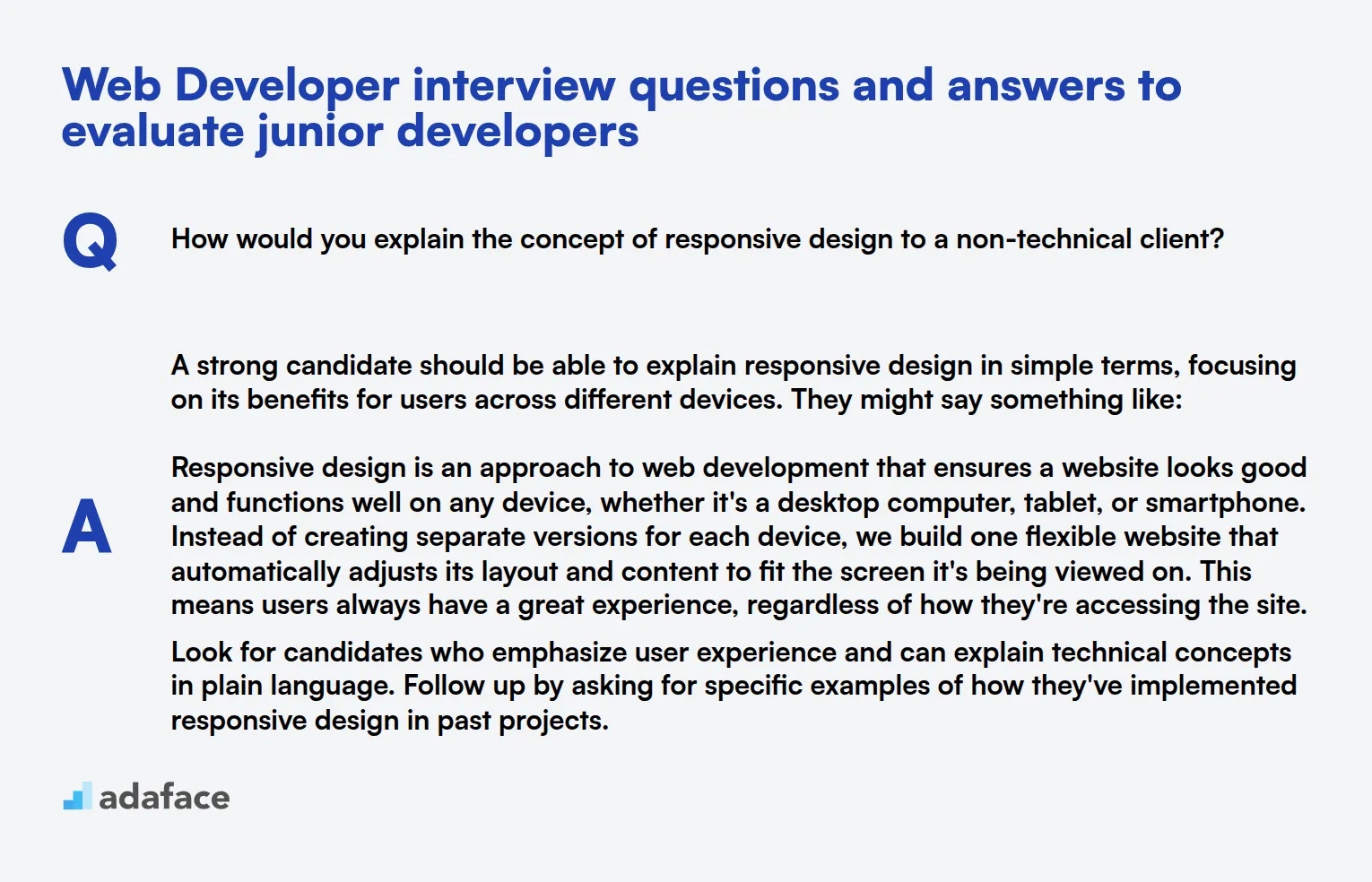
Ready to put your junior web developer candidates through their paces? These eight carefully crafted questions will help you evaluate their fundamental knowledge and problem-solving skills. Use this list to assess candidates effectively, ensuring you identify those with the right mix of technical understanding and practical aptitude for your team.
1. How would you explain the concept of responsive design to a non-technical client?
A strong candidate should be able to explain responsive design in simple terms, focusing on its benefits for users across different devices. They might say something like:
Responsive design is an approach to web development that ensures a website looks good and functions well on any device, whether it's a desktop computer, tablet, or smartphone. Instead of creating separate versions for each device, we build one flexible website that automatically adjusts its layout and content to fit the screen it's being viewed on. This means users always have a great experience, regardless of how they're accessing the site.
Look for candidates who emphasize user experience and can explain technical concepts in plain language. Follow up by asking for specific examples of how they've implemented responsive design in past projects.
2. What strategies do you use to optimize website loading speed?
An ideal answer should cover multiple aspects of web performance optimization. A knowledgeable candidate might mention:
- Minimizing and compressing files (HTML, CSS, JavaScript)
- Optimizing images by compressing them and using appropriate formats
- Leveraging browser caching
- Using a Content Delivery Network (CDN)
- Reducing the number of HTTP requests
- Implementing lazy loading for images and other content
- Minifying and combining CSS and JavaScript files
- Optimizing the order of loaded resources
Pay attention to candidates who not only list techniques but also explain why they're important and how they impact loading speed. Consider asking for examples of how they've applied these strategies in real projects.
3. How do you ensure cross-browser compatibility in your web development projects?
A comprehensive answer should demonstrate awareness of cross-browser issues and proactive strategies to address them. A strong candidate might explain:
- Using a CSS reset or normalize stylesheet to create a consistent baseline across browsers
- Regularly testing on multiple browsers and devices throughout development
- Utilizing feature detection instead of browser detection
- Implementing graceful degradation or progressive enhancement techniques
- Using tools like caniuse.com to check feature support across browsers
- Employing cross-browser compatible JavaScript libraries and frameworks
- Writing standards-compliant HTML, CSS, and JavaScript
Look for candidates who emphasize the importance of testing and have a systematic approach to ensuring compatibility. Ask about specific challenges they've faced with cross-browser compatibility and how they resolved them.
4. Can you explain the difference between 'px', 'em', and 'rem' units in CSS?
A solid answer should clearly differentiate between these units and explain their use cases:
- 'px' (pixels): A fixed-size unit that remains consistent regardless of parent element size or user settings. It's useful for precise control but less flexible for responsive design.
- 'em': A relative unit based on the font size of the parent element. 1em equals the font size of the parent. It's good for creating scalable layouts but can be tricky with nested elements.
- 'rem' (root em): Similar to 'em', but always relative to the root element (usually ). This makes it more predictable than 'em' and easier to use for consistent scaling across a website.
Evaluate candidates based on their understanding of when to use each unit. Strong candidates might mention using a combination of units for different scenarios, like 'rem' for typography and 'em' for component-level spacing.
5. How would you handle a situation where a client insists on a design change that you believe will negatively impact user experience?
This question assesses both communication skills and UX knowledge. A thoughtful answer might include:
- Listening to the client's reasons for wanting the change
- Explaining concerns about user experience clearly and respectfully
- Providing data or examples to support the current design choice
- Suggesting A/B testing to compare the current design with the proposed change
- Offering alternative solutions that address the client's concerns without compromising UX
- Being willing to implement the change if the client insists, but documenting the concerns
Look for candidates who demonstrate a balance between respecting the client's wishes and advocating for good UX practices. Strong candidates will emphasize clear communication and data-driven decision-making.
6. What's your approach to writing maintainable and scalable CSS?
A comprehensive answer should cover various aspects of CSS best practices. A knowledgeable candidate might mention:
- Using a CSS methodology like BEM (Block Element Modifier) or SMACSS for consistent naming conventions
- Employing a preprocessor like Sass or Less for variables, mixins, and nesting
- Creating a modular structure with separate files for different components or sections
- Avoiding overly specific selectors to prevent specificity issues
- Using CSS custom properties (variables) for easy theme customization
- Implementing a style guide or design system for consistency across the project
- Regular refactoring to remove unused styles and optimize performance
Evaluate candidates based on their understanding of front-end development best practices and their ability to explain how these approaches contribute to maintainability and scalability. Consider asking for examples from their past projects.
7. How do you stay updated with the latest web development trends and technologies?
This question assesses a candidate's commitment to continuous learning. A good answer might include:
- Following industry leaders and organizations on social media
- Regularly reading web development blogs and news sites
- Participating in online forums and communities (e.g., Stack Overflow, GitHub)
- Attending web development conferences or meetups
- Taking online courses or tutorials to learn new skills
- Experimenting with new technologies in personal projects
- Subscribing to newsletters or podcasts focused on web development
Look for candidates who demonstrate genuine enthusiasm for learning and can provide specific examples of how they've applied new knowledge in their work. This indicates their ability to adapt to the ever-changing landscape of web development.
8. Can you explain the concept of Progressive Enhancement and how you might implement it in a project?
A strong answer should demonstrate understanding of both the concept and its practical application:
Progressive Enhancement is an approach to web design that starts with a basic, functional version of a website or application and then progressively adds more advanced features for browsers or devices that can support them. The core principle is ensuring that the essential content and functionality are available to all users, regardless of their browser capabilities or network conditions.
Implementation might include:
- Starting with semantic HTML for structure and content
- Adding basic CSS for layout and styling
- Enhancing with advanced CSS features (like flexbox or grid) where supported
- Using JavaScript to add interactivity and dynamic features
- Employing feature detection to provide fallbacks for unsupported features
Look for candidates who emphasize the importance of accessibility and can provide specific examples of how they've applied Progressive Enhancement in their projects.
12 intermediate Web Developer interview questions and answers to ask mid-tier developers.
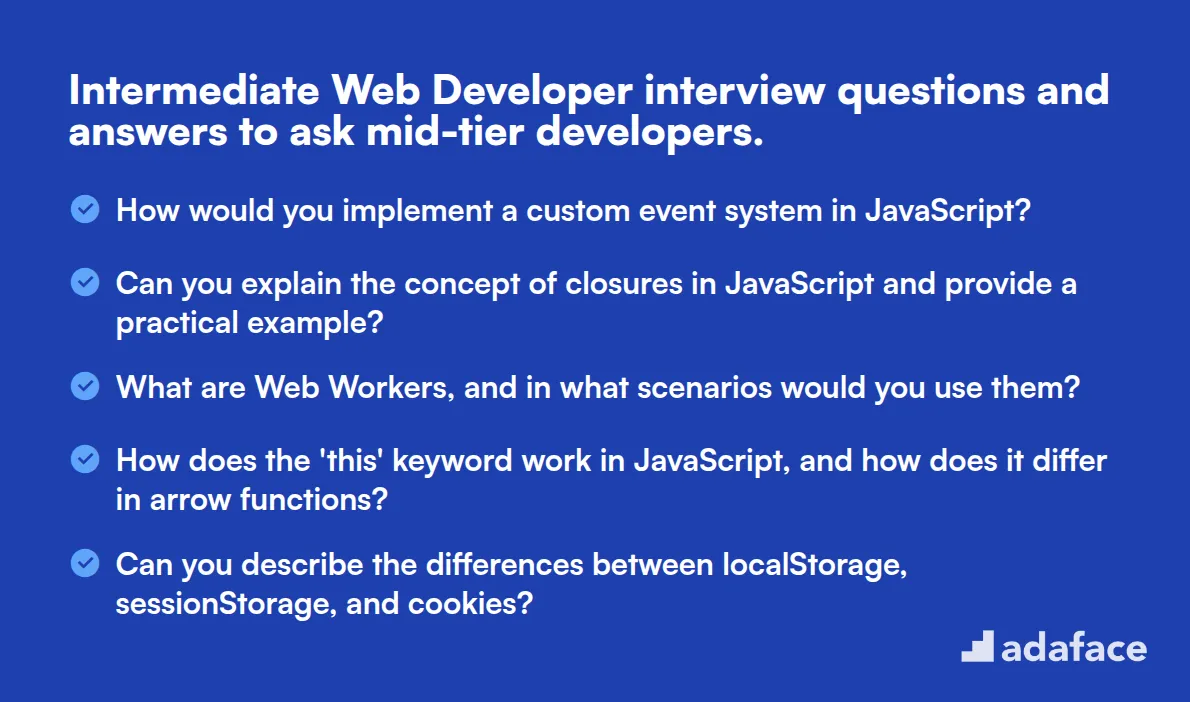
To effectively assess mid-tier web developers, use these 12 intermediate interview questions. These questions are designed to evaluate a candidate's deeper understanding of web development concepts and their ability to apply them in real-world scenarios.
- How would you implement a custom event system in JavaScript?
- Can you explain the concept of closures in JavaScript and provide a practical example?
- What are Web Workers, and in what scenarios would you use them?
- How does the 'this' keyword work in JavaScript, and how does it differ in arrow functions?
- Can you describe the differences between localStorage, sessionStorage, and cookies?
- What is the Virtual DOM in React, and how does it improve performance?
- How would you handle state management in a large-scale React application?
- Can you explain the concept of CSS Grid and how it differs from Flexbox?
- What are Service Workers, and how can they be used to create offline-capable web applications?
- How would you implement lazy loading for images in a web application?
- Can you describe the purpose and implementation of WebSockets?
- What are the key considerations when designing a RESTful API?
6 Web Developer interview questions and answers related to front-end development
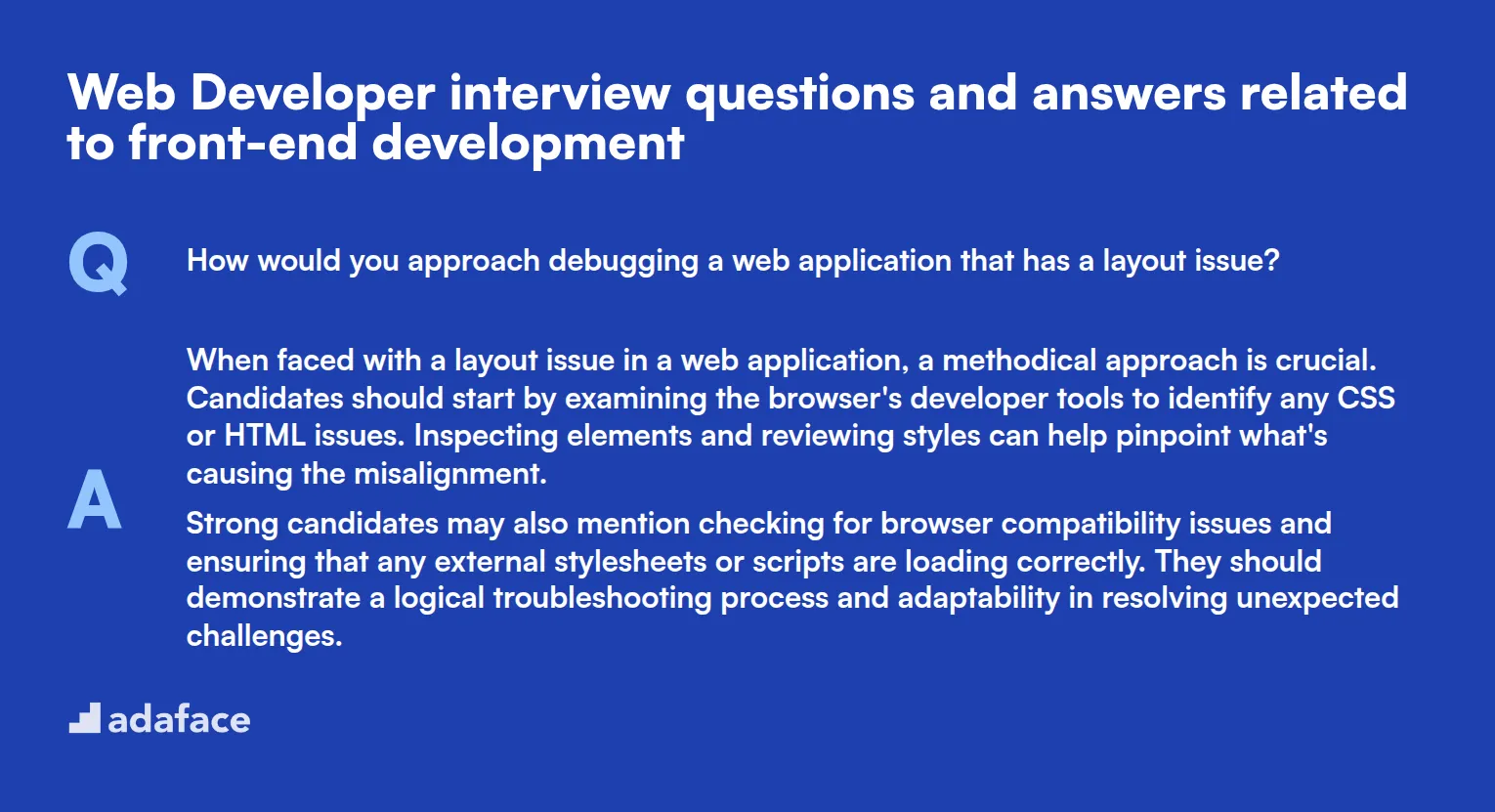
Whether you're seeking a maestro of pixels or a virtuoso of user interfaces, these front-end development questions will help you tune into the right candidate for your team. Use this list to assess the creative and technical prowess of your prospective web developer during interviews.
1. How would you approach debugging a web application that has a layout issue?
When faced with a layout issue in a web application, a methodical approach is crucial. Candidates should start by examining the browser's developer tools to identify any CSS or HTML issues. Inspecting elements and reviewing styles can help pinpoint what's causing the misalignment.
Strong candidates may also mention checking for browser compatibility issues and ensuring that any external stylesheets or scripts are loading correctly. They should demonstrate a logical troubleshooting process and adaptability in resolving unexpected challenges.
2. What strategies do you use to ensure your web applications are mobile-friendly?
Ensuring web applications are mobile-friendly involves several strategies. Candidates might discuss using responsive design techniques, such as fluid grids and flexible images, to ensure content adjusts smoothly across different devices.
They may also mention the importance of testing applications on various screen sizes and orientations, using tools like browser developer tools or online emulators. An ideal response would highlight an awareness of user experience and accessibility, ensuring that the application is not only functional but also intuitive on smaller screens.
3. Can you explain how you stay organized while working with large stylesheets?
Staying organized with large stylesheets often involves using methodologies such as BEM (Block Element Modifier) or SMACSS (Scalable and Modular Architecture for CSS). These approaches help in maintaining clean and modular CSS code, making it easier to manage and update.
Candidates might also mention using CSS preprocessors like SASS or tools like CSS-in-JS for component-based architectures, each providing structure and reusability. Strong responses should convey efficiency and an understanding of how to scale CSS for complex projects.
4. How do you prioritize features during a web development project?
Prioritizing features involves balancing client needs, user expectations, and technical feasibility. Candidates should talk about collaborating with stakeholders to identify MVP (Minimum Viable Product) features, ensuring core functionalities are delivered first.
They may also use techniques like the MoSCoW method (Must-have, Should-have, Could-have, and Won't-have) to categorize features and manage time effectively. Look for candidates who can demonstrate a strategic mindset and effective communication skills.
5. What role does SEO play in front-end development, and how do you address it?
SEO is vital in front-end development as it affects a website's visibility and user engagement. Candidates should discuss optimizing HTML elements like titles, meta descriptions, and header tags to improve search engine rankings.
They might also highlight the importance of fast load times, mobile optimization, and semantic HTML for better accessibility and indexing. An ideal candidate will demonstrate a comprehensive understanding of how front-end choices can impact overall SEO strategy.
6. How do you manage dependencies in your front-end projects?
Managing dependencies in front-end projects often involves using package managers like npm or yarn. These tools help keep track of libraries and frameworks, ensuring that the correct versions are used and easily updated.
Candidates should also mention the importance of maintaining a clean and efficient package.json file and using tools like Webpack or Parcel for bundling. Strong answers will highlight an understanding of dependency management as crucial for project stability and performance.
10 Web Developer questions related to back-end development
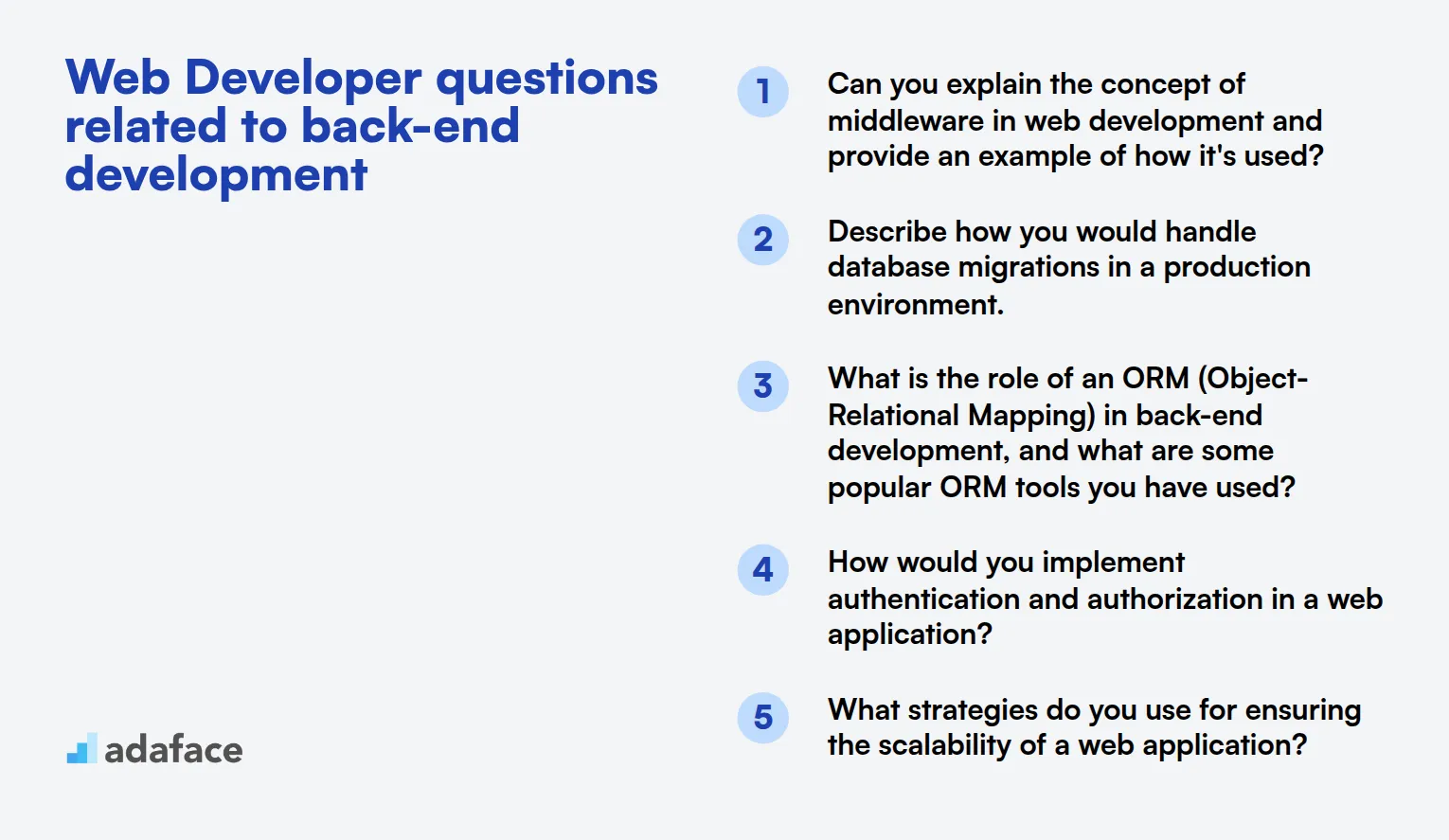
To identify candidates with the right back-end skills, use these interview questions to assess their technical knowledge and problem-solving abilities. This list will help you evaluate whether the applicants can handle essential back-end developer tasks, ensuring they are well-prepared for the challenges of the role.
- Can you explain the concept of middleware in web development and provide an example of how it's used?
- Describe how you would handle database migrations in a production environment.
- What is the role of an ORM (Object-Relational Mapping) in back-end development, and what are some popular ORM tools you have used?
- How would you implement authentication and authorization in a web application?
- What strategies do you use for ensuring the scalability of a web application?
- Can you explain the difference between SQL and NoSQL databases, and in what scenarios you would use each?
- Describe how you would approach optimizing database queries for performance.
- What are microservices, and what are the advantages and challenges of using them?
- How do you handle error logging and monitoring in your applications?
- What is caching, and how would you implement it to improve the speed of a web application?
10 situational Web Developer interview questions for hiring top developers
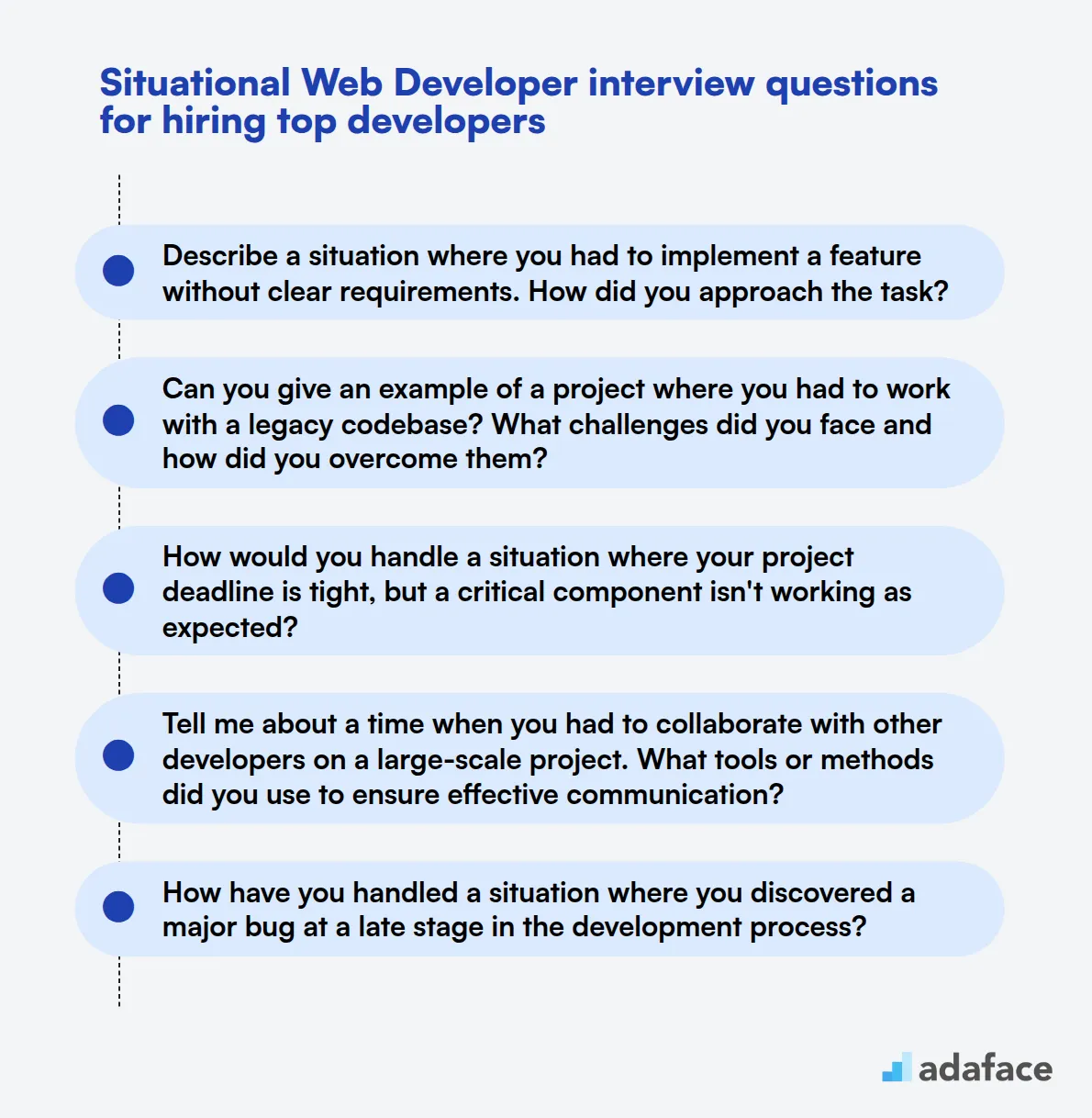
To identify top web developers who can effectively handle real-world challenges, use these situational interview questions. These queries are designed to reveal how candidates think on their feet and solve problems, helping you find the right fit for your web developer job description.
- Describe a situation where you had to implement a feature without clear requirements. How did you approach the task?
- Can you give an example of a project where you had to work with a legacy codebase? What challenges did you face and how did you overcome them?
- How would you handle a situation where your project deadline is tight, but a critical component isn't working as expected?
- Tell me about a time when you had to collaborate with other developers on a large-scale project. What tools or methods did you use to ensure effective communication?
- How have you handled a situation where you discovered a major bug at a late stage in the development process?
- Describe a time when you had to learn a new technology or framework on-the-fly to complete a project. How did you manage it?
- Can you share an experience where you had to prioritize different tasks under pressure? How did you decide what was most important?
- Explain how you would manage a project's scope if a client requests additional features midway through development.
- What steps would you take if you encountered a security vulnerability in a live application?
- How do you handle feedback or criticism about your code from peers or supervisors?
Which Web Developer skills should you evaluate during the interview phase?
While it's impossible to assess every aspect of a candidate in a single interview, focusing on core Web Developer skills is essential. These key competencies form the foundation of a developer's ability to create and maintain web applications effectively.

JavaScript
JavaScript is the backbone of modern web development. It enables interactive and dynamic content, making websites responsive and user-friendly.
Consider using a JavaScript assessment test with relevant MCQs to evaluate candidates' proficiency in this language.
To gauge JavaScript skills during the interview, you can ask targeted questions like this one:
Can you explain the difference between 'let', 'const', and 'var' in JavaScript?
Look for answers that demonstrate understanding of scope, hoisting, and best practices in variable declaration. A strong candidate will explain the block-scoping of 'let' and 'const' versus the function or global scoping of 'var'.
HTML/CSS
HTML and CSS are fundamental for structuring and styling web pages. Proficiency in these languages is crucial for creating visually appealing and well-organized websites.
An HTML/CSS online test can help you assess candidates' knowledge of these core technologies.
During the interview, you might want to ask a question like:
How would you approach making a website responsive using CSS?
Listen for mentions of media queries, flexible grid layouts, and relative units like percentages or em. A good answer will show understanding of mobile-first design principles.
Backend Development
Backend skills are essential for Web Developers who need to work with servers, databases, and application logic. This includes knowledge of server-side languages and database management.
Evaluate backend skills with a comprehensive backend engineer assessment that covers various aspects of server-side development.
To assess backend knowledge, consider asking:
Explain the concept of RESTful APIs and why they are important in web development.
Look for explanations that cover the principles of REST, such as statelessness and the use of standard HTTP methods. Candidates should also mention the benefits of RESTful APIs in creating scalable and interoperable web services.
Find the best Web Developer for your team with Adaface
When hiring a Web Developer, it is important to ensure that candidates possess the necessary skills to succeed in the role. A clear understanding of their technical abilities will help you identify the right fit for your team.
The most efficient way to verify these skills is through targeted skill tests. Consider using our Web Developer online test to accurately assess candidates' capabilities in a systematic manner.
After administering the test, you can shortlist the best applicants based on their performance. This process will help you ensure that you are inviting the most qualified candidates for interviews.
To get started, sign up on our platform or explore our test library for additional resources tailored to your hiring needs.
Web Developer Test
Download Web Developer interview questions template in multiple formats
Web Developer Interview Questions FAQs
Look for skills in HTML, CSS, JavaScript, server-side languages, databases, version control, and problem-solving abilities.
Ask them to explain their thought process, give them small coding tasks, or discuss past projects they've worked on.
Front-end focuses on user interface and experience, while back-end deals with server-side logic and database management.
Use situational questions, present hypothetical scenarios, or ask them to describe how they've overcome challenges in past projects.
Yes, tailor your questions to the experience level. Junior developers should be asked more basic concepts, while senior developers can be challenged with complex scenarios.

40 min skill tests.
No trick questions.
Accurate shortlisting.
We make it easy for you to find the best candidates in your pipeline with a 40 min skills test.
Try for freeRelated posts
Free resources




